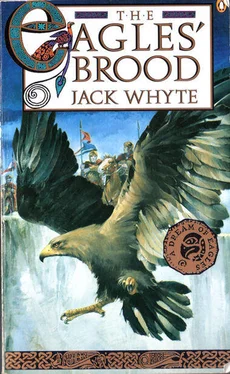The fall hammered the breath from me, and I lay gasping in agony and out of my senses for a time, whooping and sucking in terror-stricken panic for air that would not come, while chaos blossomed around me. By the time my breathing began to return to normal, I had recognized Pellus's staring, lifeless eyes gazing into my own and had realized that the piled bodies belonged to our scouts, for Orvic lay sprawled beside Pellus; the new-healed scar from the last arrow that had sought him gleamed livid. I had little doubt that all our scouts were in this pile of dead, for there must have been a dozen corpses, and Pellus had had few more than that. How they had died, how they could have been surprised so completely, would remain forever a mystery to me. Pellus had been the best, the most experienced scout I had ever known, and Orvic had been more animal than man in sensing danger. His instincts and his ability scent trouble had astounded me on many occasions over the years I had known him. And now both were dead, Pellus's throat transfixed by one arrow and a second buried in his heart while Orvic's back was arched unnaturally, as though attempting to dislodge the shaft buried between his shoulder-blades.
The sounds of conflict came back into my consciousness—all the noise of battle, the screams of men and horses, the muffled thunder of hooves, the clash and clang of weapons, and throughout all this, the lethal, whipping hiss of hard-shot arrows. Fully conscious by this time and preparing to rise to my feet, I realized that no one seemed to be shooting at me. I raised my head cautiously and looked around me. I was alone, except for my horse, which stood nearby, head down as he cropped the short grass, ignoring the carnage close by. My head was pounding painfully and I reached up to rub it, feeling instead the smooth, sun- warmed metal of my helmet. And then I heard a new sound, an onrush of fresh horsemen, and I struggled to my feet just in time to see a wedge-shaped formation of mounted men sweeping down from the hillside above to crash into the seething ranks of my own troops. To my right and left, the hillside was alive with bowmen, most of whom were now throwing their bows aside. They could not shoot, now that their own men were in the way. As they cast away their weapons, they drew swords and rushed down to join the struggle below.
I walked slowly to my horse, feeling a sensation of dizziness which faded rapidly as my strength returned. My iron- balled flail hung from my saddle bow, unused since the first confrontation with Lot's army when my father died. I raised one foot to the stirrup and pulled myself up onto the horse's back, noting as I did so that my troops were faring very badly. Many—far too many—men and horses lay strewn on the ground. The bodies bristled with arrows. Those who remained alive were packed into a dense, milling throng, dismounted survivors among them. I loosened my flail, swung it around my head, and spurred my horse towards the fighting.
I had not even had time to spur my horse to a gallop before yet another wave of horsemen came sweeping down from above, and I felt myself groan with despair and a blossoming rage that changed to incredulity as I saw the great red and gold dragon standard of Uther Pendragon at the head of the newcomers. I screamed a welcome and urged my mount forward faster, and sometime in the course of the fight, I found myself riding knee to knee with my wild, grinning cousin, sweeping all before us until we were separated by the swirling tide of the fight.
Sometime later, my great horse went to its knees beneath me, stabbed or hamstrung, and I fell forward onto the grass, losing my grip on my flail. As I lay there, winded, Uther saw me on the ground and leaped down from his horse to stand astride me, clearing a space around us with his own whirling flail and I knew that if I could only rise to my feet, the two of us together could vanquish all who stood against us. But I could not rise, with Uther straddling me. Moments later, he grunted and sprawled forward, off balance, propelled by a spear thrust to the middle of his metal backplate. I scrambled to rise to my feet, and as I did so I felt someone grasp my dangling flail and pull it, tearing the restraining thong from my wrist as I pushed myself to my knees, and then I saw my assailant, a dirty, bearded, broken-toothed, grinning madman, whirling the ball around his head, his battle-crazed eyes fixed on mine as I knelt, off balance, at his feet. I threw myself forward again, too slowly to evade the swinging ball, and the world ended.
XXXVIII
I opened my eyes in a new world, one in which I was a total stranger, a world in which I was to exist for almost two whole years.
When I opened my eyes the first time, this new world consisted of a single, white-painted room, containing four other people. I knew I was in a room. I did not know where. I knew I was in a bed. I knew that the people watching me were wearing coloured clothes: orange and green and blue and white. At least I think I knew that then. I might have simply learned it later and not remembered doing so. I did not know the people. I watched them look at me, and lean over me. I watched their mouths move. I did not know they were speaking. I did not know I was not hearing them. I did know I felt pain, I knew my head and my body were both filled with pain. Soon I closed my eyes again.
Sometime later, I was aware that the people in the room were different. Two were the same, a man and an old woman, but two were much younger. I knew none of them.
On another occasion the man, thin and dark-faced, leaned close to me, looking into my eyes. His hair was receding at the temples leaving a pointed peak, and as I looked at him I saw tiny holes high above his forehead where hair had once grown. Then his face wavered and became two faces, alternately overlapping then drifting apart. Pain pounded behind my eyes. I closed them again.
There came a time when I heard sounds before I opened my eyes. When my lids rose, I was looking at the ceiling of the white room, and the same thin, dark-faced man hovered above me, looking down. His mouth moved and I heard the sound of his voice. I knew it was his voice, but the sounds meant nothing. I became aware of movement to one side of me, but when I tried to look in that direction I could not move my head. It was fixed. Immobile.
I was aware of long passages of time, and of the pain either lessening or simply becoming more bearable.
Once I heard a bird singing somewhere and the sound of a heavy tread approaching me. I opened my eyes and found I could move my head as a large, dark-haired, broad-shouldered, heavily moustached man with blue eyes came to a stop beside me, looking down at me with a frown on his face.
"Merlyn," he said. "Caius Merlyn Britannicus, are you in there?"
I felt my throat swell and wanted to weep. I had understood what he said! He remained there watching me for some time, and I made no effort to communicate with him. I did not know that I could. Eventually he left, and as he passed from my sight, I continued to wonder what he had been trying to say. Who was Merlyn Caius Merlyn Britannicus? And who was I? The sudden knowledge that I could not answer that question in my own mind filled me with a terror that was all the more frightening because I could not remember ever having felt that way before.
I learned very soon afterwards that / was Caius Merlyn Britannicus. The old woman told me, the woman in blue who was always nearby. I watched her as she passed my bed one day, and she saw me watching her. She stopped in her tracks, motionless, and looked at me for a long time, and then she approached me and picked up one of my hands, holding it between her own.
"Caius?" she whispered. I looked at her more closely than I ever had before, taking in the whiteness of her hair, the smoothness of the skin stretched over her high cheekbones, and the deep blue of her lovely eyes. I felt her hand squeezing my own.
Читать дальше









